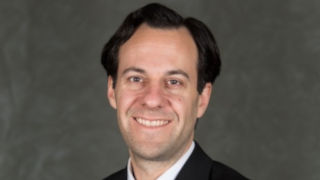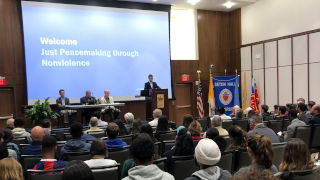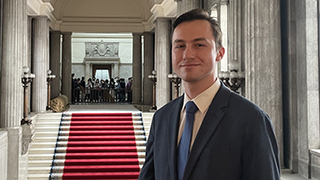Nonviolent Communication Training - Seton Hall University
Wednesday, January 22, 2020

Eli McCarthy, professor of Justice and Peace Studies at Georgetown University and the Director of DC Peace Team, leads a training workshop on Nonviolent Communication on Friday, February 14.
Building on the success of last fall's Peacemaking Conference, Seton Hall will host a half day training workshop on nonviolent communication on Friday, February 14 from 9:00 a.m. to 1:00 p.m. in the Faculty Lounge of the University Center.
Nonviolent Communication (NVC), or Compassionate Communication, is a powerful tool and virtuous habit for transforming and mediating inter-group, organizational, interpersonal, and intrapersonal conflicts. It is used worldwide by mediators, diplomats, peacebuilders, unarmed protection units, restorative justice facilitators, faith leaders, social activists, movement builders, teachers, social workers, and others.
Eli McCarthy, Professor of Justice and Peace Studies at Georgetown University and the Director of DC Peace Team, leads the training workshop, entitled "The Power of Nonviolence: Transformative Communication Skills for Diplomacy Leaders." He is the author of the upcoming book, A Just Peace Ethic Primer: Building Sustainable Peace and Breaking Cycles of Violence (Georgetown Univ. Press, 2020).

The NVC workshop continues work begun last fall at Magisterium Pacis, a two-day conference that examined the Church's role in expanding peace worldwide.
"The NVC training workshop continues the University's long history of social justice activism and peace-related work," explains Elizabeth Halpin, Associate Dean at the School of Diplomacy. In the 1930's the Seton Hall community stood up to combat the spread of Nazism. Thirty years later concern about the Vietnam War inspired an ecumenical symposium on campus. Over the years, faculty have contributed to numerous publications, presented at meetings, and conducted seminars aimed at advancing peace in our world. "We are proud of the University's legacy on peacemaking," adds Halpin. "We also know that there is a lot more work to be done and that projects like this one and the Magisterium Pacis series we have initiated are honoring our University's Catholic commitment to following a Christian path of nonviolence."
Practicing Peace
The practice of NVC focuses on the root causes or underlying human needs at play in
difficult, volatile, intense, and seemingly intractable conflicts. NVC also helps
people understand themselves more fully, provides a sense of power and choice in our
lives, and opens our hearts to compassionately connect and collaborate more fruitfully
with others. Workshop participants will develop an understanding of Nonviolent communication
skills and practice these skills in simulated situations.
McCarthy expects participants to gain a deeper awareness of their own needs and a stronger connection with others in the group. The practice, he says, "has led to breakthroughs in personal well-being and key relationships. There has been a grounding connection within groups that enable an abiding sense of solidarity and that we are all in this together. Many have gone on to become trainers in NVC and to share with their local communities and networks." Participants, he predicts, will want to apply the training in interpersonal situations with roommates, friends, family, at school or work.
If you're interested in joining the NVC workshop on February 14, please RSVP to [email protected] to request a spot. Space is limited.
Categories: Arts and Culture






